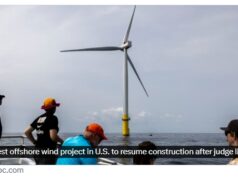I’m posting the following press release from Food & Water Action, as well as a letter from “over 20” environmental and progressive groups, not because I agree with *all* of it (although I do agree with a lot of it), but because I absolutely *do* think it raises some important points about the Virginia Clean Economy Act (VCEA) and Virginia’s path going forward. For instance:
- I *strongly* agree with Jennifer Lewis, Executive Director of Friends of Augusta, that “Now is not the time for half measures when it comes to tackling the number one threat to our existence, climate change…We are in desperate times and we must take drastic steps to a clean, more just future, now. Our elected officials have a responsibility to listen to science and research instead of corporate donors.”
- I also *strongly* agree with Food & Water Watch’s Virginia organizer, Jolene Mafnas, that “We need a just transition to 100% renewable energy by 2035, and that transition needs to place the communities already most impacted by the fossil fuel industry and climate change front and center.”
- I join with the groups signing this letter in urging the Virginia General Assembly NOT to take the Virginia Clean Economy Act’s passage as an ending point, but as a *start* – and to come back next year and “enact significantly stronger climate and energy legislation than the VCEA in 2021.”
- Among the good ideas listed in the letter, I strongly agree that the legislature should move to “commit the state to a 100% clean renewable energy grid by 2035, put a moratorium on all new fossil-fuel infrastructure, enact stronger worker and environmental justice (EJ) protections, establish aggressive ratepayer protections, and address how to reduce greenhouse gas emissions from transportation to zero.”
- On nuclear energy, I’d argue that we should keep the generating capacity we currently have, until we are able to reach 100% truly clean energy – efficiency, solar, wind, tidal, geothermal, etc., but not build more nuclear power, if for no other reason than it’s ridiculously expensive, far more so than efficiency, utility-scale solar, etc.
- I also strongly agree that there’s no good reason to “[exclude] fossil-fuel power plants operated by cooperatives, independent power producers, industrial utilities, and municipally-owned utilities from RPS requirements.”
- Whether or not the VCEA is a “de facto moratorium” on new fossil fuel capacity, it would be a good idea to put a de jure moratorium in place. Because, the fact is, the science is crystal clear that we need to rapidly slash global warming pollution – CO2, methane, etc. – and building *new* fossil fuel capacity completely contradicts and undercuts that imperative.
- I mostly support RGGI, although probably both the claims for how (supposedly) amazing it is and also for how (supposedly) bad it is are overblown. On balance, though, I tend to come down on the side of the Union of Concerned Scientists, which writes that “RGGI is a Proven Success” – “from demonstrating the viability of a market-based policy to address power plant global warming emissions, to raising hundreds of millions of dollars for investments in energy efficiency, clean energy, and other consumer-benefit programs.”
- As for ratepayer protections, I’m all for them as long as we stick with the state-protected monopoly utility model. But really, why stick with that? Why not open up Virginia to competition in the energy business? And why not put a significant price on carbon pollution – one that can be revenue neutral, with proceeds going back overwhelmingly to help lower-income people upgrade in terms of energy efficiency, install rooftop solar, etc? This would start to provide the correct economic incentives, as opposed to the “market failure” and massive “negative externalities” we see now.
- In the end, I supported passing VCEA, largely because we needed to start somewhere; because VCEA was the only “legislative vehicle” that seriously and comprehensively (albeit inadequately for now) addressed this issue; *and* had a snowball’s chance in hell of actually passing the Virginia General Assembly this past session. But my argument was *always* that VCEA should be the starting point, not the ending point, and that we needed to build on this in coming years…just as other states have done with their Renewable Portfolio Standards, etc.
With that, here’s the introductory email and letter…
Virginia Groups Highlight Insufficiency of VCEA, Call for Stronger Climate Legislation Next Session
As the Virginia Clean Economy Act receives Northam’s signature, climate and social justice advocates speak out to say Virginia deserves better environmental protections, more emphasis on just transition
Richmond, VA — Although the passage of the Virginia Clean Economy Act has been met with fanfare as Virginia becomes the first southern state to join the Regional Greenhouse Gas Initiative (RGGI), Virginia’s environmental and social justice community has come together to educate about the law’s inadequacies and demand better legislation next session.
The sign-on letter, released today, includes signatures from over 20 Virginia groups, including Virginia Poor People’s Campaign, Virginia Justice Democrats, Indivisible Virginia, and Food & Water Action. In total, these groups represent membership in the tens of thousands. In the letter, the coalition emphasizes the VCEA’s pitfalls: its too-late deadline for a 100% transition, failure to shut down fossil fuel construction already polluting communities in Virginia, and refusal to place an emphasis on equity in plans for a renewable energy transition.
The letter also critiques RGGI, a program that the VCEA legislation commits Virginia to. The sign-on letter refers to RGGI as a “pay-to-pollute scheme,” an ineffective corporate-driven program that neglects Environmental Justice (EJ) communities.
“This piece of legislation amounts to little more than what corporations have previously committed to without any push from Virginia’s government,” says Jolene Mafnas, Virginia Organizer for Food & Water Action. “Because of its industry alignments, the VCEA fails to protect Virginia’s communities and workers. We need a just transition to 100% renewable energy by 2035, and that transition needs to place the communities already most impacted by the fossil fuel industry and climate change front and center. The VCEA doesn’t meaningfully address these issues, but we will continue fighting for legislation that does going into the 2021 session.”
“Now is not the time for half measures when it comes to tackling the number one threat to our existence, climate change,” says Jennifer Lewis, Executive Director of Friends of Augusta. “We are in desperate times and we must take drastic steps to a clean, more just future, now. Our elected officials have a responsibility to listen to science and research instead of corporate donors.”
“Climate scientists in 2018 said we had 12 years to drastically reduce our carbon emissions; that means the target year is 2030, not 2050,” says Andrea Miller, founder and Executive Director of People Demanding Action. “Either the authors of this bill are climate science deniers or extremely bad at math.”








![Wednesday News: “From Greenland to Minneapolis, it’s all rooted in [Trump’s] predatory ways”; “Trump’s Politics Are Not America First. They’re Me First.”; “The 25th Amendment Isn’t Going to Work”; Halligan Out After “Charade”; McGuire, McPike Win Big](https://bluevirginia.us/wp-content/uploads/2026/01/montage012126-100x75.jpg)

![Sen. Tim Kaine: Tommy Tuberville “brands [Ghazala Hashmi] an ‘enemy.’ Because she’s an immigrant? A Muslim? A woman? A poet?”](https://bluevirginia.us/wp-content/uploads/2026/01/tubervillekaine-100x75.jpg)